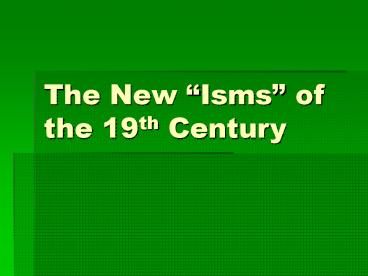The New Isms of the 19th Century - PowerPoint PPT Presentation
1 / 28
Title:
The New Isms of the 19th Century
Description:
Impact on American policies. On the Wealth of Nations. Thomas Malthus ... Charles Fourier: Confused Thinker or Absurd Eccentric? ... – PowerPoint PPT presentation
Number of Views:364
Avg rating:3.0/5.0
Title: The New Isms of the 19th Century
1
The New Isms of the 19th Century
2
Conservatism
- Beliefs
- Importance of order and stability
- Strong authority figure (monarch)
- Change is bad
- Cause
- Excesses of the French Revolution
3
Famous Conservatives
- Edmund Burke
- Reflections on the Revolution in France (1790)
- Society is partnership of living, dead, and yet
to be born - Sudden change unacceptable
- Social contract cant be destroyed
4
Famous Conservatives
- Joseph de Maistre
- Societys first task is self-preservation
- People are selfish authority must check
- Hereditary monarchy is best
5
Conservatism in action
- Great Britain
- George IV
- Abandoned Whigs when he became regent
6
- Great Britain
- Rule of the Tories
- Corn Laws
- Peterloo Massacre
7
Conservatism in action
- France
- Louis XVIII
- Accepted some liberal reform
8
France
- Charles X
- Indemnity to aristocrats
- Church education
9
Conservatism in action
- Italy
- Under Austrian domination
- Carbonari
- Spain
- Bourbon rule
- Dissolved parliament
- Tore up constitution
10
Conservatism in action
- German States
- Burschenschaften
- Karlsbad Decrees of 1819
11
Conservatism in action
- Russia
- Alexander I
- Relaxation pre-Napoleon
- Strict and arbitrary censorship
- Nicholas I
- Decembrist Revolt 1825
- Northern Union
- Ultra-reactionary
- Secret Police
12
Liberalism
- Economic liberalism
- Belief in minimal government control of business.
13
Economic Liberalism
- Adam Smith
- Laissez-faire policies
- Impact on American policies
- On the Wealth of Nations
14
Thomas Malthus
- Essays on the Principles of Population (1798)
- Population will always increase faster than food
- If government helps the poor, population wont be
checked
15
David Ricardo
- Iron Law of Wages
- You cant intervene by increasing wages or you
will have overpopulation
16
Political Liberalism
- Freedom from restraint
- Protection of civil rights
- Religious toleration
- Separation of church and state
- Limited suffrage
17
Political Liberalism
- John Stuart Mill
- On Liberty
- Utilitarianism
- Absolute freedom of opinion and sentiment on all
subjects
18
Nationalism
- Definition Awareness of being a part of a
community - Implications
- Self-determination by nationalities
- Political boundaries by nationalities
19
German Nationalism
- Kleindeutsch
- Push for greater cooperation between German
states led by Prussia, excluding Austria-Hungary - Grossdeutsch
- All German confederation
- What provision from the Congress of Vienna fueled
this debate? - German Confederation (Bund)
- Austria designated as President of the Diet
20
What do countries within the confederation have
in common?
21
Early Socialism Utopian Socialism
- Utopian Socialists
- Opposed to private property
- Social democracy
- Redistribution of wealth
22
Henri de Saint Simon (1760-1825)
- Intellectual elites and industrial managers
coordinate society into cooperative communities - "New Christianity" -- a secular humanist religion
to replace the defunct traditional religions --
was to have scientists as priests
23
Charles Fourier Confused Thinker or Absurd
Eccentric?
- Fourier's passion for numbers led him to predict
that the ideal world he was helping to create
would last 80,000 years, 8,000 of them in an era
of Perfect Harmony in which - androgynous plants would copulate
- six moons would orbit the earth
- the North Pole would be milder than the
Mediterranean - the seas would lose their salt and become oceans
of lemonade - the world would contain 37 million poets equal to
Homer, 37 million mathematicians equal to Newton
and 37 million dramatists equal to Molière,
although "these are approximate estimates" - every woman would have four lovers or husbands
simultaneously
24
Charles Fourier (1772-1838)
- Small model communities (phalanstere. )
- Self-contained cooperatives
- People communally housed
- Agricultural communities
25
Fouriers phalanstere was to become a
self-contained community housing 1,620 members
with a myriad of subdivisions designed to
encourage a dynamic interplay of various human
passions. Why 1,620? Well, Fourier had determined
that there are 810 different psychological types
-- if you multiply this by two (male and female),
you arrive at a figure of 1,620.
26
Robert Owen (1771-1858)
- Competition is the root of problems
- Observations on the Effect of Manufacturing
System - founded the famous New Lanark Mills in Scotland
as an example of the viability of co-operative
factory communities.
27
New Harmony, Indiana
- a more perfect society through free education and
the abolition of social classes and personal
wealth - Owen gives up when people dont abide by rules.
28
Louis Blanc (1813-1882)
- The Organization of Work
- Social problems can be solved by government
assistance - Government workshops (state financed people own
and work)

